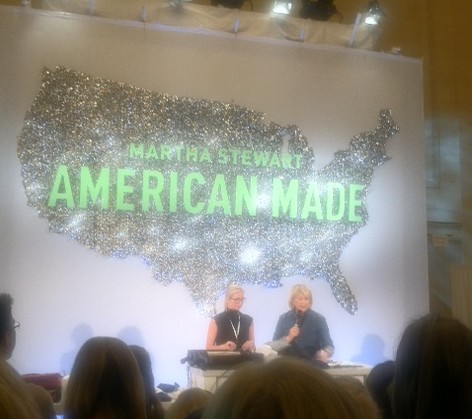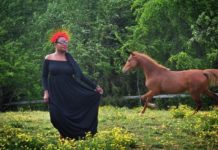By Jane Applegate
A very thin woman who introduced herself as Martha’s personal trainer was standing by the coffee station when I arrived at Martha Stewart’s American Made Talks & Workshops in New York City.
“Happy or lean?” she asked, pointing to two gleaming coffee urns.
“Hmm… happy, I guess,” I replied. As I filled my cup, she explained that Martha’s neighbors have a new specialty coffee company that adds some “magic” ingredients to “amp-up” the coffee.
My “happy” coffee set the tone for a lively day with more than 300 Martha Stewart fans who paid $305 for tickets and traveled from near and far to listen to small business advice from Martha and her A-lister entrepreneurs and friends. A few blocks away, winners of her American Made Awards filled Vanderbilt Hall in Grand Central Station with their wares.
Among them were Marie Puillot, a young event planner from Alberta, Canada who scheduled her U.S. vacation around attending the conference. Sullivan Owen, a floral and event designer, made the trip from Philadelphia.
Throughout the day, which included delicious pastries, fresh fruit, juices and lamb patties, Stewart was gracious and upbeat, posing for pictures and chatting with devoted fans before and after a few sessions. She also shared a few personal stories.
When asked what errors she’d made in building her multimedia (“Omnimedia”) empire, she admitted she had made some “employee mistakes. But, I don’t like to look back,” she said. “I like to look forward.” Her best advice: “Business is not worth crying over—cry over the important things.”
Makeup maven Bobbi Brown, fitness entrepreneur Tracy Anderson, Alexis Maybank of Gilt Groupe and Barbara Corcoran, real estate guru and an investor on ABC’s “Shark Tank” were among the panelists sharing practical business tips and insights with the rapturous crowd.
“I was the most naïve person on the planet,” admitted Brown, who explained she had no idea about what she wanted to do with her life when her mother suggested she think of what would give her a really happy birthday. “I told her I wanted to spend a day in the makeup department of Marshall Field’s,” said Brown, who grew up in Chicago and shopped at the iconic retailer.
That day, she found her passion. She headed to Boston to create her own make-up oriented major at Emerson College. After graduating, she moved to New York City. Frustrated with the greasy, bright lipsticks available, she collaborated with a cosmetic chemist to develop a line of natural lip-colored lipsticks. They agreed to split the profits 50/50. When the line was ready to launch, Brown met the cosmetics buyer for Bergdorf Goodman who offered her counter space. The buyer set a goal of selling 100 lipsticks a month. But, friends and family members flocked to the store and bought 100 in a day.
From there, she built her reputation as a celebrity makeup artist and continued to add products to her Bobbi Brown line. In 1995 Brown sold the company to Estee Lauder, but still remains the chief creative officer of the brand. Brown pointed out she works hard to have a life and a business, raising three children and splitting her time between homes in New Jersey and Telluride, Colorado.
Smart Site Design
Several guest experts emphasized the importance of having a dynamic website that is mobile-friendly. People are impatient and don’t want to wait for your website to load. Also, often what looks great on a laptop screen often looks bad on a smartphone. “Design for mobile first,” advised Craig Nevill-Manning, engineering director of Google and creator of “Froogle,” a product search engine. “And, don’t overlook the value of having a ridiculously simple home page—it worked for us.” He also suggested not going crazy trying to create a trendy design. “Copy what works—don’t rearrange the buttons.”
Other experts suggested if you are not sure what kind of site to design, start with a great splash page and use social media to drive traffic to that one page to test response and start collecting email addresses.
The only panel that proved problematic was one on “Pioneering Creative Communities.” The audience seemed puzzled by a panel discussion featuring the head of New York’s film and television community, the designer of the High Line Park and Jane Rosenthal, producer and CEO of Tribeca Enterprises, which produces the Tribeca Film Festival.
However, sessions on brand building and “doing well while doing good” were engaging and well-attended.
Stewart honored several small companies with her American Made Awards, including Archi’s Acres, an avocado ranch in Escondido, California that helps train veterans to become farmers through a six-week course. Quilt maker Maura Grace Ambrose, of Austin, Texas won for her Folk Fibers company that sells handmade quilts. Back to the Roots founders, Alejandro Velez and Nikhil Arora, from Oakland, Calif. began their business with a $5,000 grant from UC Berkeley. They sell an oyster mushroom growing kit that uses recycled coffee grounds, and recently launched a fish tank that grows herbs. Charles Pinnel of Crozet, Virginia makes and sells leather goods to clients around the world at Pinnel Custom Leather.
Jane Applegate is the national correspondent for SmallBizDaily.com, author of four books on small business success and co-founder of the FabulousFemaleNetwork.com. The Applegate Group is a multimedia production company.







